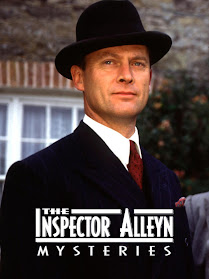"What do you write--or should I ask?" Grant asks.
"I write innocuous heroines out of my system, that's all."
"Tilda the tweeny with the hare-lip and the homicidal tendencies, as an antidote to Maureen [one of Lavinia's heroines]."
I thought of this quote recently as I finished up Georgette Heyer's romance novels. I had previously read about 1/3rd to a 1/2 of them, and I should state that I am, overall, a fan. However, a certain type of heroine takes over the novels towards the end, and I was heartily sick of that type by the time I finished, enough to wish for a homicidal maniac.
The type might be best described as "nice sorority house leader."
This type of Heyer heroine is commonsensical, entirely devoted to practical matters, level-headed, perhaps a little managing but for everyone's good, a kind of Emma but without Emma's deep flaws (Heyer's heroines never go THAT far) or Emma's acerbic sense of humor. This type of Heyer heroine has a "lively sense of humor" but it is never quite as trenchant or wry as, say, that of Austen's Elizabeth.
She also seems to have little to no interest in religion, archaeology, writing, history, gardening, or anything else. Rather, she is a social operator. She goes to parties and goes horse-back riding and takes care of various charges dumped on her doorstep and manages a household.
In truth, she is an entirely decent character type!
A great deal of my annoyance with the type comes from the pretense that the woman is supposedly fighting society's conventions because she lives independently and hasn't married past the age of twenty-two.
But the independence is entirely based on an independent income or allowance. And the character never really fights the social milieu, even by the standards of Regency England (seriously). She doesn't decamp to Egypt or start prison reform or marry a footman (Regency women did), and one can't shake the feeling that her creator would consider those things rather tacky.
Heyer's heroine flouts "convention" by doing the equivalent of posting something "out there" on Twitter but never enough that she leaves the Anglican fold or invests in scientific discoveries or actually has affairs or enters politics (yes, women did enter politics, in their own way, in the Regency Era).
But a great many of the latter books seem entirely dependent on "good" women behaving in "good" ways while a bunch of characters pretend those women aren't entirely conventional, based, I suppose, on the way such women occasionally stand up for themselves. (They attend rallies on their college campuses in between hosting society shindigs.)
 |
| Malahide's comedic timing softens the |
| "I'm so popular" stuff |
The type reminds me of Ngaoi Marsh's Inspector Alleyn. Marsh was one of a number of writers who were quite condescending and above-it-all about "that poor Dorothy Sayers falling in love with her detective, Wimsey." Marsh prided herself on creating a thoroughly unpretentious detective without any of those, tsk tsk, affectations.
Except Alleyn is, in essence, a good fraternity boy. Sure, he is humble and self-effacing, but Marsh never lets us forget how much people admire him whilst they are defending his humble, self-effacing self. And he never really crosses any lines. Everyone in Marsh's novels treats him as "oh, my, isn't he something else," but in fact, he would never do anything that would embarrass his creator.
In comparison, Sayers was perfectly willing to have plenty of her characters loathe Wimsey, who is quite flawed and human and does embarrassing things all the time. Sayers knew what it felt like to invite ridicule.I like Marsh's mysteries, and I like many of Heyer's romances. But being constantly reminded of the thoroughly tasteful and seemly (yet nonetheless strong-minded) personality of a heroine gets rather irritating after awhile.
 Give me Jane Eyre's utter disdain at high society folks (based on nothing more than her sense of self) or Catherine Morland's penchant for Gothic horrors or Jo's aggressive unhappiness at Amy's behavior.
Give me Jane Eyre's utter disdain at high society folks (based on nothing more than her sense of self) or Catherine Morland's penchant for Gothic horrors or Jo's aggressive unhappiness at Amy's behavior.
Don't ask me to applaud a heroine for checking all the right boxes: knows society's ways, speaks out on the right topics, dresses correctly, attracts envy and liking, lives "alone" (with aunts or siblings), shows compassion, makes fun of the people who deserve it, protects children, does just enough (but not too many) risky things to raise eyebrows, participates in all the same stuff as everyone else.
Again--perfectly acceptable and usable character type.
But I prefer the type (and the writing) to be honest.


